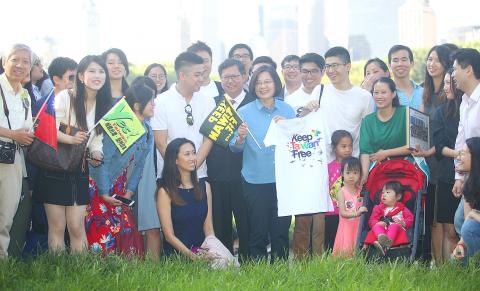President Tsai Ing-wen (蔡英文) held closed-door meetings and spoke with US officials, including having a teleconference with US House of Representatives Speaker Nancy Pelosi, during her layover in New York, National Security Council Deputy Secretary-General Tsai Ming-yen (蔡明彥) said.
Tsai Ming-yen made the remarks on the president’s chartered flight as the delegation left the US for Haiti on Saturday.
Tsai Ing-wen met American Institute in Taiwan Chairman James Moriarty soon after her arrival in the city on Thursday afternoon, and the following day met former US secretary of state Richard Armitage, before speaking with Pelosi on the telephone, he said.

Photo: CNA
The president expressed gratitude for the US’ and Pelosi’s support of Taiwan, including the US House of Representatives’ passage of the National Defense Authorization Act for Fiscal Year 2020 on Friday, which includes a section supporting continued US arms sales to Taiwan, Tsai Ming-yen said.
Before attending a banquet with the Taiwanese-American community on Friday evening, the president spoke with a number of US senators and representatives, Tsai Ming-yen said.
US congressional members were interested in the Taiwan-US relationship and voiced support for Tsai Ing-wen’s role in pragmatically growing bilateral ties, he said, adding the relationship between Taiwanese and US officials is good and trust between the two runs high.
On Saturday, the president took a tourist ferry on the Hudson River past the Statue of Liberty.
“Seeing her at a close distance helped me better appreciate the significance of the existence of freedom and democracy,” Tsai Ing-wen wrote on Facebook.
The statue represents the freedom of the US, and illuminates the path in front of democratic countries, she wrote.
Before departing the Big Apple for the Caribbean to visit four diplomatic allies at about noon on Saturday, Tsai Ing-wen walked in Central Park with young Taiwanese who mostly settled in New York after finishing their studies in the US.
During her visit to New York, Tsai also met with the UN representatives of Taiwan’s diplomatic allies at Taiwan’s liaison office in New York and delivered a speech at Columbia University.
However, Chinese groups protested her visit outside the hotel she was staying at, and were involved in physical altercations with pro-Taiwan groups.

DAREDEVIL: Honnold said it had always been a dream of his to climb Taipei 101, while a Netflix producer said the skyscraper was ‘a real icon of this country’ US climber Alex Honnold yesterday took on Taiwan’s tallest building, becoming the first person to scale Taipei 101 without a rope, harness or safety net. Hundreds of spectators gathered at the base of the 101-story skyscraper to watch Honnold, 40, embark on his daredevil feat, which was also broadcast live on Netflix. Dressed in a red T-shirt and yellow custom-made climbing shoes, Honnold swiftly moved up the southeast face of the glass and steel building. At one point, he stepped onto a platform midway up to wave down at fans and onlookers who were taking photos. People watching from inside

A Vietnamese migrant worker yesterday won NT$12 million (US$379,627) on a Lunar New Year scratch card in Kaohsiung as part of Taiwan Lottery Co’s (台灣彩券) “NT$12 Million Grand Fortune” (1200萬大吉利) game. The man was the first top-prize winner of the new game launched on Jan. 6 to mark the Lunar New Year. Three Vietnamese migrant workers visited a Taiwan Lottery shop on Xinyue Street in Kaohsiung’s Gangshan District (崗山), a store representative said. The player bought multiple tickets and, after winning nothing, held the final lottery ticket in one hand and rubbed the store’s statue of the Maitreya Buddha’s belly with the other,

‘NATO-PLUS’: ‘Our strategic partners in the Indo-Pacific are facing increasing aggression by the Chinese Communist Party,’ US Representative Rob Wittman said The US House of Representatives on Monday released its version of the Consolidated Appropriations Act, which includes US$1.15 billion to support security cooperation with Taiwan. The omnibus act, covering US$1.2 trillion of spending, allocates US$1 billion for the Taiwan Security Cooperation Initiative, as well as US$150 million for the replacement of defense articles and reimbursement of defense services provided to Taiwan. The fund allocations were based on the US National Defense Authorization Act for fiscal 2026 that was passed by the US Congress last month and authorized up to US$1 billion to the US Defense Security Cooperation Agency in support of the

‘COMMITTED TO DETERRENCE’: Washington would stand by its allies, but it can only help as much as countries help themselves, Raymond Greene said The US is committed to deterrence in the first island chain, but it should not bear the burden alone, as “freedom is not free,” American Institute in Taiwan Director Raymond Greene said in a speech at the Institute for National Defense and Security Research’s “Strengthening Resilience: Defense as the Engine of Development” seminar in Taipei yesterday. In the speech, titled “Investing Together and a Secure and Prosperous Future,” Greene highlighted the contributions of US President Donald Trump’s administration to Taiwan’s defense efforts, including the establishment of supply chains for drones and autonomous systems, offers of security assistance and the expansion of